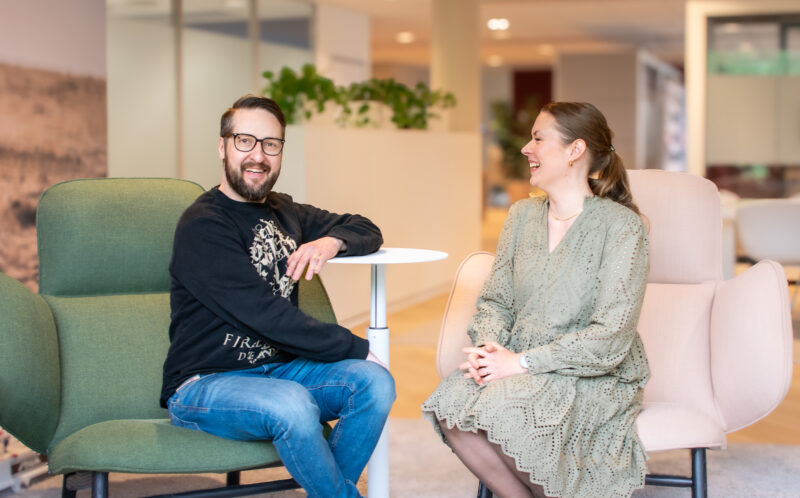Why did the best universities in the world take an interest in the Finnish way of doing things?
The open BT standard provides every organisation with a level playing field for digital transformation on their own terms. Therefore, it represents a similar example of a culture of openness that benefits everyone, akin to the Finnish concept of ‘everyman’s right,’ which allows the public to freely roam and enjoy nature on private land, argue Business Technology Forum’s Katri Kolesnik and Sofigate’s Juha Kujala.
There are roughly two general ways to modernise the business technology at the heart of an organisation’s operations – an ERP or CRM system, for example. An organisation can seek to change as little or as much as possible in the transformation.
In the first, closed way, the organisation tries to customise the system to be as similar as possible to its previous system. In this way, it seeks to avoid the need for its organisation and staff to change their ways of working. However, the more the system is customised, the less useful the new functionality and capabilities become. In the worst case, the technology that has been customised is so deadlocked that the end result may even be worse than the initial situation.
In the second option, the organisation is more open and approaches the renewal as a holistic business transformation project. When it adopts a new system, it also changes the way its organisation works in order to maximise the benefits of both the new technology and the new business opportunities.
An operational change is almost always better for the bottom line. While transforming the way you work and the organisation as a whole is a demanding process, the good news is that it does not have to be done from scratch. There are ready-made models that an organisation can freely adopt and adapt to its own individual needs.
Transparency benefits everyone
The Business Technology Standard is an open framework for digital transformation management that provides organisations planning a transformation with ready-made, proven best practices. The BT Standard is a set of best practices, templates and tools that can be used to design, build, and manage information technology in a flexible and scalable way, regardless of an organisation’s industry, geography, or size.
The BT standard facilitates and accelerates an organisation’s transformation journey by providing a common language for business and IT management. Most importantly, it helps business leaders understand the business logic of IT and thus make better business technology decisions and ultimately better business decisions. It ensures that transformation always has the right owner, and that business management cannot delegate strategic decisions to lower levels of the organisation.
The key to the BT standard is its transparency. By making the business models freely available to any organisation, the organisation is free to adapt the models to meet its own needs. At the same time, the open framework and common approaches break down barriers between different parts of the organisation and its partners.
The Business Technology Forum, part of the Sofigate group, is a non-profit organisation that is continuously developing the BT standard in collaboration with different organisations. This openness and the opportunity to develop the model with others encourages organisations to share their own best practices so that others can benefit from them.
Successful transformation is everyone’s right
Why is openness in the interest of all companies using technology? Because it helps companies to transform themselves more efficiently, profitably and humanely, which is in the interest not only of companies and the people who work for them, but also of society as a whole. By being open about things that are not directly competitive advantages, organisations can better focus on the core of their business and on things that genuinely deliver said advantages. Everyone wins and no one loses.
Common frameworks and knowledge sharing help companies understand that technology’s role is to serve the organisation, not the other way around. At the same time, organisations understand that transformation is always fundamentally about people. New technology is simply a tool to help organisations and the people who work in them to transform and achieve their goals.
The BT standard is used by thousands of companies and public organisations in Finland, the Nordic countries and around the world. King’s College London and many other top universities around the world have called the BT standard a model of openness that promotes efficiency and well-being in Finnish society. The openness of the BT standard often surprises international organisations accustomed to strict protection of property rights – much like the Finnish concept of ‘everyman’s right,’ which allows free access to nature on private land and often pleasantly surprises tourists visiting Finland.
The cherished Finnish concept of ‘everyman’s right’ ensures everyone has equal access to enjoy nature. It serves as a uniquely Finnish example of openness that benefits everyone without causing harm to anyone. The BT standard is like a digital version of this. Its openness gives every organisation an equal opportunity to make the most of the opportunities offered by technology, as efficiently and effectively as possible.
Read more:
Do you invest in savings or employee experience – or both?
Authors
Katri Kolesnik leads Sofigate Group’s non-profit Business Technology Forum, which develops and distributes the BT model, an open framework for business technology management. Katri is passionate about helping people and organisations find a common language and practices to support the achievement of organisational goals driven by technology.
Juha Kujala is Chief Technology Officer in Sofigate’s Platforms business. His professional passion is to drive organisations towards better services by leveraging the potential of new technologies. Juha has extensive experience with the ServiceNow platform and service development management.


